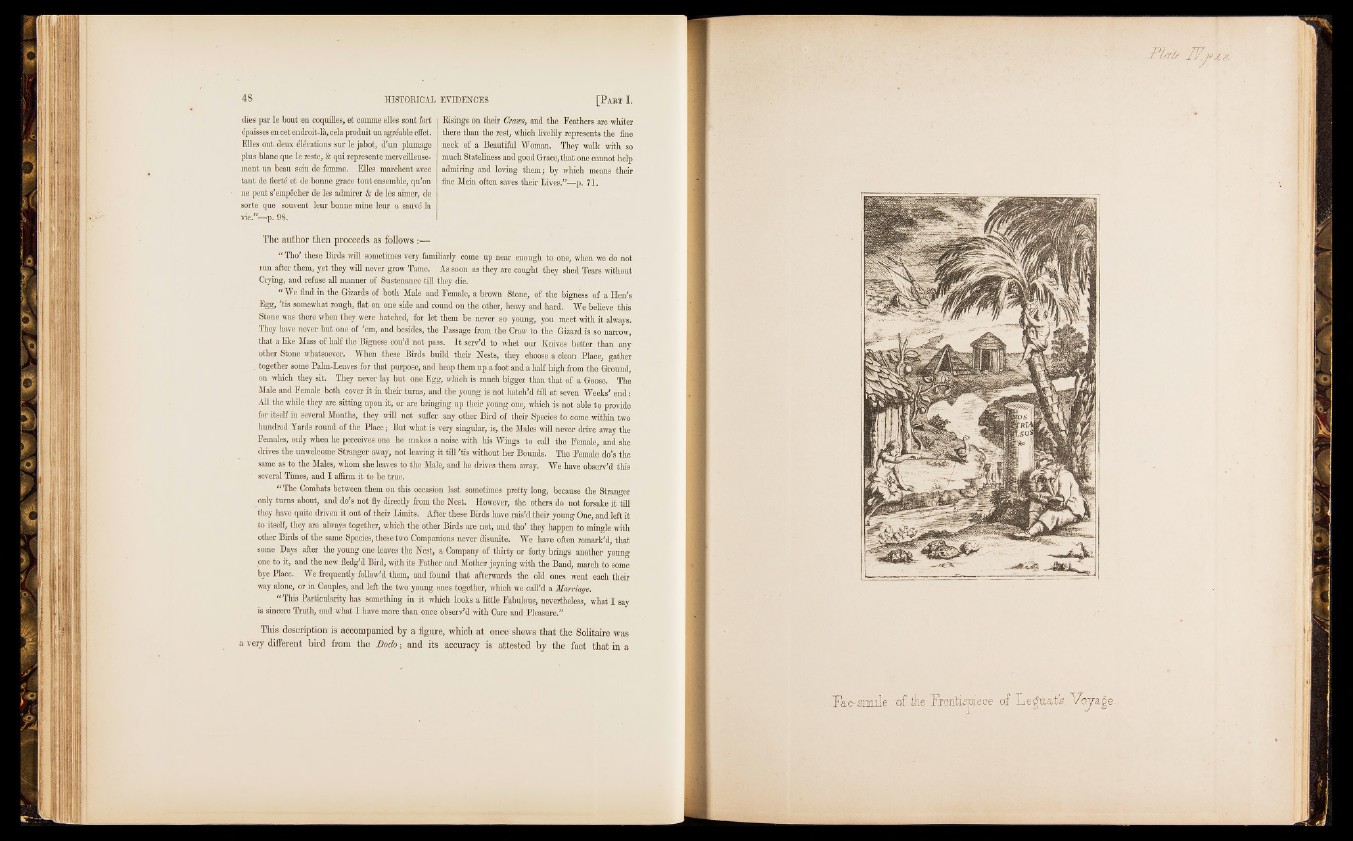
<ües par le bout en coquilles, et comme elles sont fort
épaisses en cet endroit-là, cela produit un agréable effet.
Elles ont deux élévations sur le jabot, d'un plumage
plus blanc que le reste, & qui représente merveilleusement
un beau sein de femme. Elles marchent avec
tant de fierté et de bonne grâce tout ensemble, qu'on
ne peut s’empêcher de les admirer & de les aimer, de
sorte que souvent leur bonne mine leur a sauvé la
vie."—p. 98.
Risings on their Craws, and the Feathers are whiter
there than the rest, which livelily represents the fine
neck of a Beautiful Woman. They walk with so
much Stateliness and good Grace, that one cannot help
admiring and loving them; by which means their
fine Mein often saves their Lives."—p. 71.
The author then proceeds as follows :—
“ Tho' these Birds will sometimes very familiarly come up near enough to one, when we do not
run after them, yet they will never grow Tame. As soon as they are caught they shed Tears without
Crying, and refuse all manner of Sustenance till they die.
“We find in the Gizards of both Male and Female, a brown Stone, of the bigness of a Hen's
Egg, 'tis somewhat rough, flat on one side and round on the other, heavy and hard. We believe this
Stone was there when they were hatched, for let them be never so young, you meet with it always.
They have never but one of 'em, and besides, the Passage from the Craw to the Gizard is so narrow,
that a like Mass of half the Bigness cou'd not pass. It serv'd to whet our Knives better than any
other Stone whatsoever. When these Birds build their Nests, they choose a clean Place, gather
. together some Palm-Leaves for that purpose, and heap them up a foot and a half high from the Ground,
on which they sit. They never lay but one Egg, which is much bigger than that of a Goose. The
Male and Female both cover it in their turns, and the young is not hatch'd till at seven Weeks' end:
All the while they are sitting upon it, or are bringing up their young one, which is not able to provide
for itself in several Months, they will not suffer any other Bird of their Species to come within two
hundred Yards round of the Place; But what is very singular, is, the Males will never drive away the
Females, only when he perceives one he makes a noise with his Wings to call the Female, and she
drives the unwelcome Stranger away, not leaving it till 'tis without her Bounds. The Female do's the
same as to the Males, whom she leaves to the Male, and he drives them away. We have observ'd this
several Times, and I affirm it to be true.
“ The Combats between them on this occasion last sometimes pretty long, because the Stranger
only turns about, and do's not fly directly from the Nest. However, the others do not forsake it till
they have quite driven it out of their Limits. After these Birds have rais'd their young One, and left it
to itself, they are always together, which the other Birds are not, and tho' they happen to mingle with
other Birds of the same Species, these two Companions never disunite. We have often remark'd, that
some Days after the young one leaves the Nest, a Company of thirty or forty brings another young
one to it, and the new fledg'd Bird, with its Father and Mother joyning with the Band, march to some
bye Place. We frequently follow'd them, and found that afterwards the old ones went each their
way alone, or in Couples, and left the two young ones together, which we call'd a Marriage.
“ This Particularity has something in it which looks a little Fabulous, nevertheless, what I say
is sincere Truth, and what I have more than once observ'd with Care and Pleasure."
This description is accompanied by a figure, which at once shews that the Solitaire was
a very different bird from the Dodo ;. and its accuracy is attested by the fact that in a
P late
Fao-samle of iàe Frontispiece of Léguais. "Voyage.